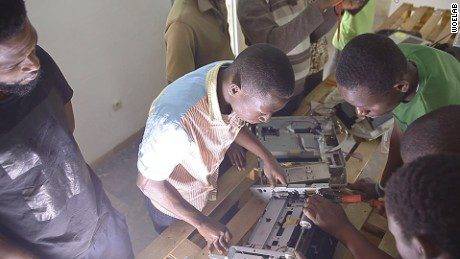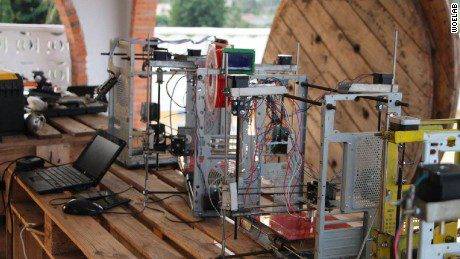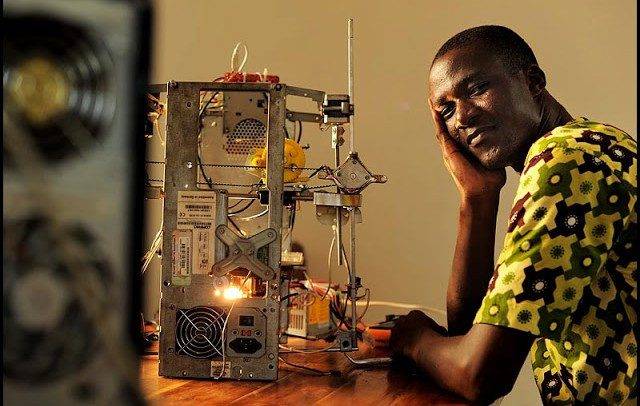e-Waste To e-Wealth: This Togolese Tech Team Has Built Over Twenty 3D Printers From Trash

Although it doesn’t get enough mentions – since it is often swept under the carpet as trivial in favour of its ‘more popular cousins’ – the world has an electronic waste (e-waste) problem and Africa, in particular, finds itself in a precarious position. The continent is battling with what seems like a mountain of it, in a literal sense.
Large expanses of the continent’s terrestrial and aquatic habitat have become dumping grounds laden with a barrage of junk phones, scrap computers, and TVs that have found their way to this part of the globe from the more-advanced western world.
These ‘digital dumpsites’ have proliferated across Africa, and the common practice of charring them only puts undue strain on the health of the environment, which has a bearing on the ever-fragile health of the inhabitants.
The situation rarely gets talked about, but as the problem has all the makings of one that will escalate to worrying levels sooner than later, maybe it’s time someone did something about it.
And actually, a group of people has gotten busy on that front. Okay, I’m not exactly a fan of the ‘when there is a problem, there is a solution’ saying, (I mean, why can’t we just not have any problems?), but it does warm the heart that some people are putting in great work at a community level to fix some parts of our broken, or perhaps, breaking world.

On that note, here’s one many don’t know about; Lome, the Togolese capital, is home to a group of people who have figured out a way to solve Africa’s e-waste problems and create value while at it.
Some six years ago, a Togo-based innovation lab known as WoeLab, pulled off an extraordinary feat when it put together a team that created what is widely considered the first “Made-in-Africa” 3D Printer.
But that’s not all, this achievement came on the backs of many trips to the so-called digital dumpsites – and that’s what makes it an even more impressive accomplishment.
That’s a mild way of saying the Togolese team rolled up their sleeves and literally got their hands dirty collecting tonnes of e-waste, before repurposing it. After several months of toiling and tinkering, their efforts culminated in a working 3D Printer that is entirely made in Africa.
When 37-year-old Sénamé Koffi Agbodjinou took on the noble yet Herculean task of establishing a community tech hub in his homeland, there were only a handful of true believers who thought it would amount to anything more than an elephant project. But somehow, the dream came to life.
And again, when Sénamé, who himself, is a trained architect, procured a 3D Printer for the lab, he couldn’t have had anything more than giving form to the imaginations of the innovators at heart – he couldn’t have had any inkling of what was to come next.
From the moment the 3D Printer arrived at the premises, it got the young innovators buzzing with fascination and awe. Those feelings soon gave way to curiosity, and before long, whispers had grown into loud calls to collaborate on something similar using the resources available – scrap.
Within a year of salvaging parts of discarded computers, printers, and scanners, the team had built its first 3D Printer.
That was in 2013, and it only signaled the beginning. Since then, the team has gone on to build 20 other finished products from e-waste, and it sure looks like there is more in the offing.

Sénamé Koffi Agbodjinou established WoeLab in 2012 as a grassroots network of homegrown inventors and entrepreneurs whose collective aim is to build a ‘digital democracy.’ And the 3D Printer was their own way of hitting the ground running.
In what could be described as an audacious move, the team is now looking to place a 3D Printer in every school within one kilometre of the lab to foster the development of technical skills in students from an early stage.
“What we are concerned with is to try to create in the young people, a confidence in themselves in their capacity to realise projects,” Sénamé says.
The basis for the design of WoeLab’s 3D Printer is the low-cost RepRap 3D Printing Model. Experts at the University of Bath are credited for the original development of the model which is capable of printing plastic objects of up to fifty cubic centimetres in size.
WoeLab’s variation of the model was the result of a joint effort, with several individuals collaborating on the project and ultimately bringing it to successful completion. Although the 3D Printer represents a major win for WoeLab, the team is not resting on its laurels as it hopes to inspire a continent-wide revolution in the area of technology.

Electronic waste mars the continent. Staggering volumes of old and broken electronic devices are discarded and dumped in toxic landfills across Africa every year. Agbogbloshie; a Ghanaian suburb, is one of the worse hit globally as it laden with up to 42 megatons of e-waste per annum.
Unstable chemicals in items like batteries, fridges, and other equipment, produce deadly carcinogenic toxins and these items are hardly recycled or reused. This poses a substantial environmental problem – one that the team at WoeLab is looking to solve by salvaging some of those discarded materials.
More than just building printers from e-waste, the innovation hub which currently houses as many as 50 individuals, is now channeling efforts towards ‘building robots from waste that can also handle waste.’ And on account of their pedigree, we might just be talking about it soon.
Interestingly, the genius from Togo appears to have rubbed off on a number of other African countries as reports have it that students at Buni Hub; a mini fabrication lab in Tanzania, have pulled off something very similar.
Another example can be cited in ‘Project Daniel’ in which 3D Printing is being employed in making prosthetics for Sudanese amputees by an organisation known as Not Impossible.